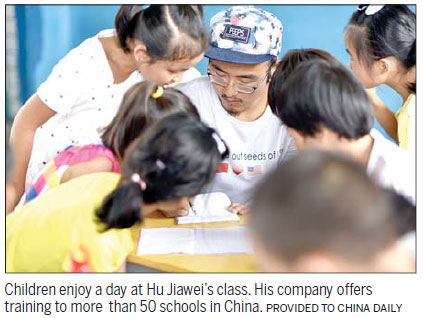Hu Jiawei, a 22-year-old college student from Jiangnan University, has a busy summer break. He is the founder and CEO of his social enterprise that provides training and materials for sex education for children to teachers and parents.
Hu and his team have travelled to several cities to join start-up expos, deliver training sessions to school teachers and meet parents at lectures and forums.
When he returns to the company's office at the university's makerspace, he sees new maker peers are moving in. Some that have been successfully incubated at the space are establishing their own entities outside the campus now.

In the 98-square-meter room shared with other three start-ups, Hu established his social enterprise Bao Hu Doudou Technology Ltd in 2014 as a sophomore.
Now the enterprise has provided training to more than 50 schools, and has developed teaching materials, an online cuerrirculm and reading materials for children.
The rental for Hu's enterprise is about 500 yuan a month , which is about 20 percent of the market price, as one of the privileges that the makerspace offers to start-ups.
Makers also have easy access to display rooms in order to showcase their products and services.
They can use the cafe-meeting room for business talks and presentations, and join lectures and training delivered by the on-hand experts.
This team of experts helps makers to identify their business model and tackle technical problems before they can finally become established enterprises and successfully incubated.
"One of the best parts of working here in the makerspace is that you learn from your peers and get resources that help you to get your project widely known. The support is far more than just financial. It is all-faceted and empower start-ups to become sustainable, like raising up toddlers so they can walk by themselves in the future," says Hu.
The makerspace at Jiangnan University is one of the hundreds of incubators in Wuxi. The city's municipal government has employed significant resources and launched a series of policies to encourage college students, graduates and researchers to start companies and strive for innovation, as the city aspires to become an innovation hub.
For example, at Wuxi New District (formerly known as Wuxi National Hi-tech Industry), start-up projects can apply for local government funding when they have secured initial "angel" investment.
The size of financial support from local government fund could be similar to that of the angel investment, and the fund will exit when the projects have secured their next round of funding. In Wuxi, support for mass entrepreneurship and innovation must be efficient because only in this way can it be sustainable, said Yin Xueyan, National University Science Park of Jiangnan University .
"There are a lot of competitions, roadshows and exhibitions that start-ups can join in Wuxi to promote themselves, and only the excellent ones which have survived rounds of screening are chosen to be incubated. Support, be it financial or not, must be allocated to the best projects, those which are likely to be successful and create value for society, such as offering employment opportunities. Cheap funding will only lead to insufficiency and lower quality.
At makerspace, about 70 percent of projects are successfully incubated, which is a relatively high figure," said Yin.
wuyiyao@chinadaily.com.cn
Highlights
Governments at various levels in Wuxi have introduced a slew of policies to boost development of makers, providing services and financial supports for start-up entrepreneurs.
At services centers of State Administration of Taxation in Wuxi, makers find brochures and prospectus for makers who are eligible for a series of favorable policies designed to focus on start-up enterprises, such as tax refund, and guidebooks that go as detail as how to fill forms for declaration and claiming tax relief.
"Start-up entrepreneurs need to learn a lot when managing an enterprises, so the more services, guidance and help we can provide, the more time they can deploy on business itself. So please feel free to ask one of our experts who are glad to answer your questions," said a booklet, giving directions to free-of-charge consultancy services on taxation.
China Daily
For a scholar focusing on Australia's public diplomacy, working as a recreational manager in China may never be part of his career path. But Bradley McConachie does have lots to say now about his special experience at a resort in the picturesque tropical coastal city of Sanya in South China's Hainan province.

One of the potentially most traumatic things a girl has to go through is finding a new hairdresser.